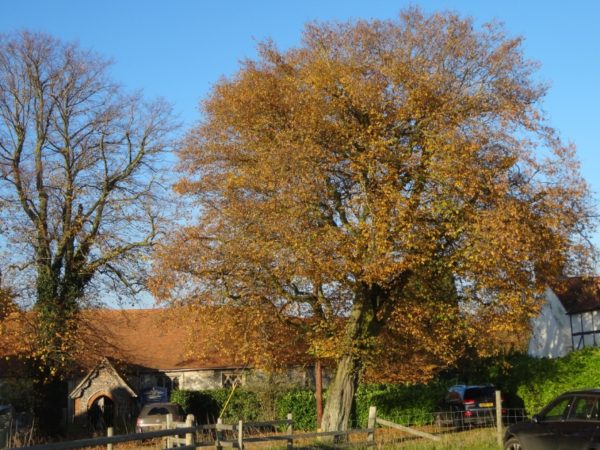
Ipsden Church in Autumn
Feet! Suddenly winter boots that have served me well for several years have let me down and a week ago, after a day of walking round Cheltenham – not very arduously – I returned home with a painful tendonitis along the top of one of my feet. A few years ago I bought 3 pairs of near identical boots and all, much resoled and heeled, have worked well with insole supports. Obviously no longer. After a weekend resting my foot (which fortunately combines well with knitting and sewing) action was necessary. Skechers Go Walk shoes have been brilliant for me over the past few summers and put a stop to painful plantar fasciitis – (tendonitis of the bottom of the foot, aka policeman’s foot), so we set off into Cheltenham on Monday morning to see if we could find some Skechers shoes and boots that could see me through winter(s). Thank goodness, we were lucky and I came away with 2 pairs of suede loafers, a pair of suede lace up boots (not my first choice of style but they were too comfortable to ignore) and a pair of men’s leather chelsea boots, which latter I also persuaded my husband into (in his size naturally). Daily walks and lots of rest and I’m relieved that just 8 days later, the pain and swelling has subsided and things are definitely getting back to normal. Rarely have I spent so much money with such joy and I can now more happily face the coming winter!
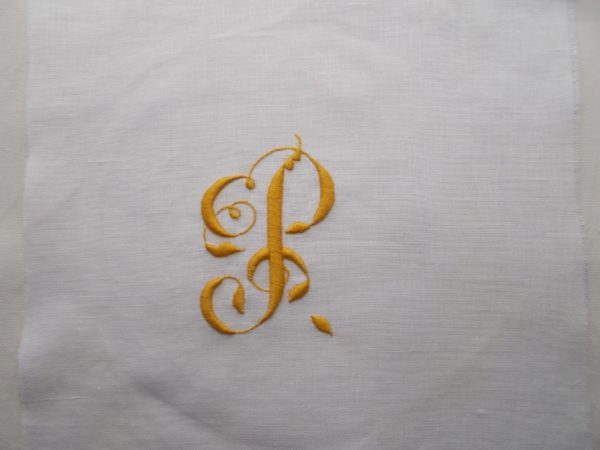
Embroidered letter P (hand embroidered by Mary Addison)
The alphabet continues with a rather glorious life affirming P. This is modelled directly on another of Jessica Hische’s brilliantly conceived capital letters but with the addition of little golden leaves at the end of its curls. These are all too appropriate now as the trees, which seemed to stubbornly hold on to theirs for longer than expected, have suddenly had enough and just in the last few days have decided to shed vast numbers of mainly very yellow leaves. Derwent May in his Nature Notes column in Wednesday’s Times newspaper confirms this and says it is turning out to be a very yellow autumn with reds little in evidence.
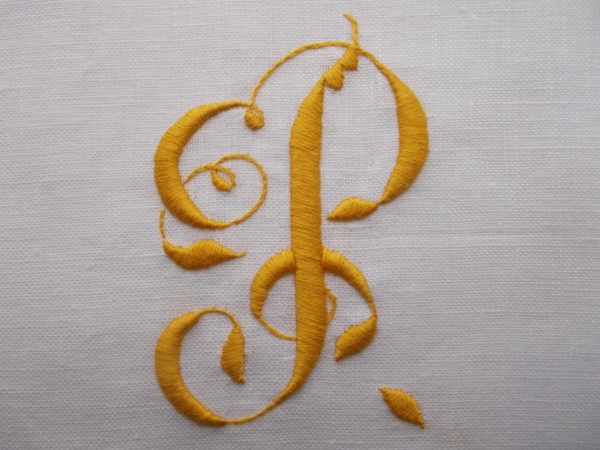
Embroidered letter P with golden leaves (hand embroidered by Mary Addison)
In fact, generally, British woods tend to yellow in autumn as relatively few native European trees go red before leaf fall – rowan being one of those few and wild cherry which can go quite scarlet. Introduced species, like acer and the North American oak, dot our landscape with red but these are comparatively few and far between. Curiously yellow and orange pigments (flavonoids and carotenoids) surface as chlorophyll declines and is reabsorbed, while red pigments, or anthocyanins are newly manufactured. Autumn, or Fall, is much redder in N.America and E.Asia because more trees of ancient origins have survived. Evergreen tropical trees, the early ancestors of deciduous trees, didn’t lose their leave in autumn; they then evolved into evergreen temperate trees, which of course also didn’t lose their leaves and from these deciduous temperate trees evolved. It is now thought that redness of leaves evolved before the mass leaf dropping habit of deciduous temperate trees. Perhaps the red pigments provided protection from leaf eating animals which are now long extinct, or perhaps red is a signal to bring animals to the tree so that they can harvest the seeds and berries. Some think red pigments may have anti-fungal qualities or protect the leaf from the damages of sunlight as it transports important chemicals out of the leaf and into the safe keeping of the twig. It may be that redness evolved for one reason but then in a happy accident turned out to be useful for other reasons. Scientists are just not sure.
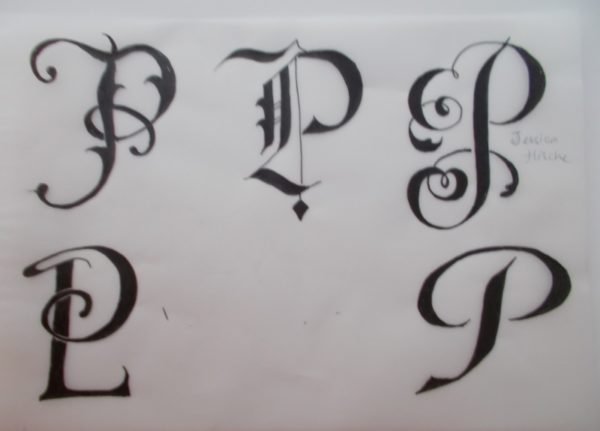
Sketches of various Ps found online
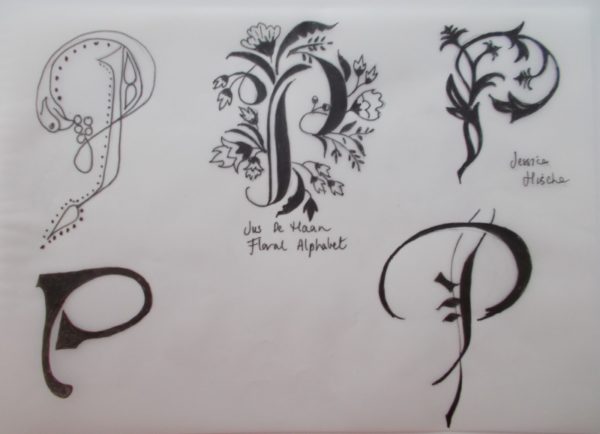
Sketches of various Ps found online
In 2002 I went to American Sublime, Landscape Painting in the United States, 1820-1880 an exhibition at Tate Britain which showed American artists taking a romantic view of their own landscapes and out-turnering Turner in their depictions of suns setting on an idyll of meaningful landscape. The Hudson River group of artists was founded by the Englishman Thomas Cole and included Frederick Church and Jasper Cropsey (I don’t think you had to have a surname beginning with C but maybe it helped). The British public was as entranced in 2002 as it had been in the mid C19th. When Queen Victoria saw Cropsey’s Autumn – On the Hudson River she thought he must have exaggerated the colour and in her forthright way, told him so. He later sent her a package of brilliantly coloured leaves – the only real reply.
(Church and fellow Hudson River School painter Sanford Robinson Gifford went on with others to found the Metropolitan Museum of Art in New York.)
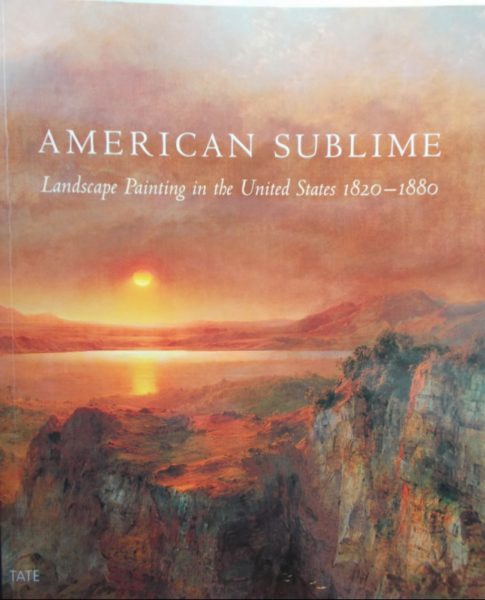
American Sublime: Landscape Painting in the United States 1820-1880: Andrew Wilton &Tim Barringer (Tate Publishing 2001) Catalogue to the Exhibition
Autumn can be wonderful – but to appreciate it properly, you do need sun and preferably no rain. This week we have been lucky.

8 Comments
A wonderfully informative post, Mary. I visit your blog on Mondays to look at (and admire) your beautiful embroidery and knitting but you always give me so much more. Thank you so much!
Such a kind comment, Nella. Very encouraging! Thank you.
What a wonderful post, Mary. Information on autumn leaves, shoe buying (I too need some) and American landscape painters. I hope Queen Victoria acknowledged with good grace the parcel of leaves. All this and a wonderful dashingly aristocratic P. Many thanks.
Glad you enjoyed it Anne. I don’t think we know whether Queen Victoria responded with good grace to her parcel of leaves but at least her comment brought to our attention the fact that autumn/fall has quite different characteristics depending on where it’s experienced.
Hope you aren’t suffering the horrific Californian fires. Our hearts go out to those who have lost so much.
We’ve been fortunate to see a lot of really shouting reds, but I agree, it’s been a very amber sort of autumn!
And now suddenly all the leaves are off the tree and it’s the east wind that’s doing the shouting. Brrrr.
What a great story about Queen Victoria and the leaves – having this year seen a really good color year in Maine its easy to understand how one might think that the accounts of brilliant colors were exaggerated. I hope the package of leaves retained their color – I frequently bring exceptionally lovely leaves home from a walk and notice later in the week that the color is by then nothing special.
ceci
I’m afraid history doesn’t relate whether the leaves sent to Queen Victoria kept their colour, Ceci and I don’t know whether the above evolutionary explanation was available to her. I, however, like that explanation and it makes me happy to accept the gloriously greater redness of your Fall.